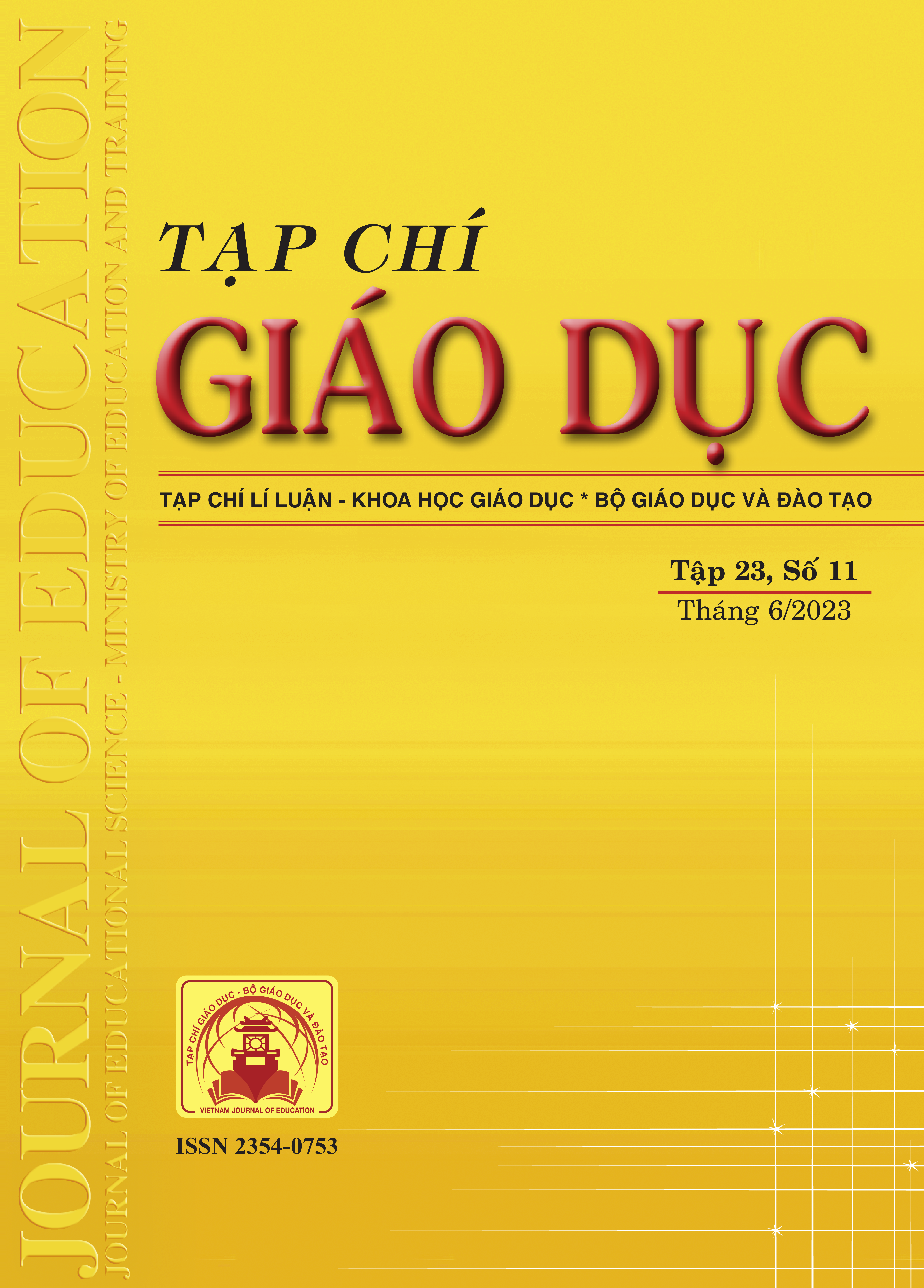Xu hướng nghiên cứu về mô hình học vi mô ở bậc đại học: một nghiên cứu trắc lượng
Tóm tắt
Micro learning model (micro learning) that first appeared in the 2000s has become increasingly popular in the field of education and training in recent times. Firstly used in continuing education in corporate settings, microlearning has since expanded to include other levels of education, including secondary school, vocational training, and higher education. However, in Vietnam, micro-learning is still a new concept and there has not been much research and application in practice. In this study, we analyzed 90 articles, conference papers, books and book chapters on undergraduate microlearning indexed by Scopus for the period 2002-2021. Based on bibliometric analysis and content analysis, this study will provide a rough picture of microlearning at undergraduate level, including research trends, document types, countries, affiliations, author, highly cited publications, research subjects and key attributes of microlearning.
Tài liệu tham khảo
Aria, M., & Cuccurullo, C. (2017). Bibliometrix: An R-tool for comprehensive science mapping analysis. Journal of Informetrics, 11(4), 959-975.
Bruck, P. A., Motiwalla, L., & Foerster, F. (2012). Mobile Learning with Micro-content: A Framework and Evaluation. Bled eConference.
Cai, C. J., Ren, A., & Miller, R. C. (2017). WaitSuite: Productive use of diverse waiting moments. ACM Transactions on Computer-Human Interaction (TOCHI), 24(1), 1-41.
Díaz Redondo, R. P., Caeiro Rodríguez, M., López Escobar, J. J., & Fernández Vilas, A. (2021). Integrating micro-learning content in traditional e-learning platforms. Multimedia Tools and Applications, 80, 3121-3151. https://doi.org/10.1007/s11042-020-09523-z
Dixit, R. K., Yalagi, P. S., & Nirgude, M. A. (2021). Breaking the walls of classroom through Micro learning : Short burst of learning. Journal of Physics, 1854(1), 012018. https://doi.org/10.1088/1742-6596/1854/1/012018
Eldridge, D. (2017). Developing a microlearning strategy with or without an LMS. eLearning and Software for Education.
Fozdar, B. I., & Kumar, L. S. (2007). Mobile learning and student retention. International Review of Research in Open and Distance Learning, 8(2), 1-18.
Gao, C., & Wang, J. (2017). Mobile Teaching of Digital Mapping Based on the WeChat Official Account Admin Platform. International Journal of Emerging Technologies in Learning (Ijet). https://doi.org/10.3991/ijet.v12i07.7225
Hesse, A., Ospina, P. A., Wieland, M., Yepes, F. L., Nguyen, B., & Heuwieser, W. (2019). Short communication: Microlearning courses are effective at increasing the feelings of confidence and accuracy in the work of dairy personnel. Journal of Dairy Science, 102(10), 9505-9511. https://doi.org/10.3168/jds.2018-15927
Hug, T. (2006). Microlearning: A New Pedagogical Challenge (Introductory Note). In T. Hug, M. Lindner, & P. A. Bruck, (Eds.), Microlearning: Emerging Concepts, Practices and Technologies After E-Learning, Proceedings of Microlearning Conference 2005: Learning & Working in New Media (pp. 8-11). Innsbruck, áustria: Innsbruck University Press.
Jaschke, S. (2014). Mobile learning applications for technical vocational and engineering education: The use of competence snippets in laboratory courses and industry 4.0. International Conference on Interactive Collaborative Learning. https://doi.org/10.1109/icl.2014.7017840
Javorcik, T., & Polasek, R. (2018). The Basis for Choosing Microlearning Within the Terms of E-Learning in the Context of Student Preferences. International Conference on Emerging ELearning Technologies and Applications. https://doi.org/10.1109/iceta.2018.8572183
Nikou, S. A., & Economides, A. A. (2018). Mobile‐Based micro‐Learning and Assessment: Impact on learning performance and motivation of high school students. Journal of Computer Assisted Learning, 34(3), 269-278. https://doi.org/10.1111/jcal.12240
Paiva, A., & Machado, I. (2002). Lifelong training with Vincent, a web-based pedagogical agent. International Journal of Continuing Engineering Education and Lifelong Learning, 12(1-4), 254-266. https://doi.org/10.1504/IJCEELL.2002.000433
Park, Y., & Kim, Y. J. (2018). A Design and Development of micro-Learning Content in e-Learning System. International Journal on Advanced Science, Engineering and Information Technology, 8(1), 56. https://doi.org/10.18517/ijaseit.8.1.2698
So, H. J., Roh, S. Z., Oh, J. E., Lee, H., Lee, J., & Ji, S. (2018). Adult learners' perspectives about microlearning: Implications on the design of bite-sized content. In M. M. T. Rodrigo, J-C. Yang, L-H. Wong, & M. Chang (Eds.), ICCE 2018 - 26th International Conference on Computers in Education, Main Conference Proceedings (pp. 488-493). Asia-Pacific Society for Computers in Education.
Vargas, P. R., & Soriano, C. (2019). Blockchain in the university: a digital technology to design, implement and manage global learning itineraries. Digital Education Review, 130-150. https://doi.org/10.1344/der.2019.35.130-150
Wen, C., & Zhang, J. (2014). Design of a microlecture mobile learning system based on smartphone and web platforms. IEEE Transactions on Education, 58(3), 203-207.
Yin, J., Goh, T. T., Yang, B., & Xiaobin, Y. (2021). Conversation technology with micro-learning: The impact of chatbot-based learning on students’ learning motivation and performance. Journal of Educational Computing Research, 59(1), 154-177.
Zahirović Suhonjić, A., Despotović-Zrakić, M., Labus, A., Bogdanović, Z., & Barać, D. (2019). Fostering students’ participation in creating educational content through crowdsourcing. Interactive Learning Environments, 27(1), 72-85.
Ziebarth, S., & Hoppe, H. U. (2014). Moodle4SPOC: A Resource-Intensive Blended Learning Course. Lecture Notes in Computer Science, 359-372. https://doi.org/10.1007/978-3-319-11200-8_27
Tải xuống
Đã Xuất bản
Cách trích dẫn
Số
Chuyên mục
Giấy phép

Tác phẩm này được cấp phép theo Ghi nhận tác giả của Creative Commons Giấy phép quốc tế 4.0 .












